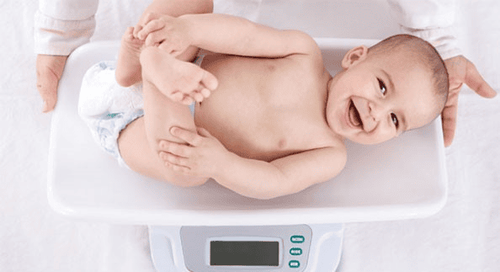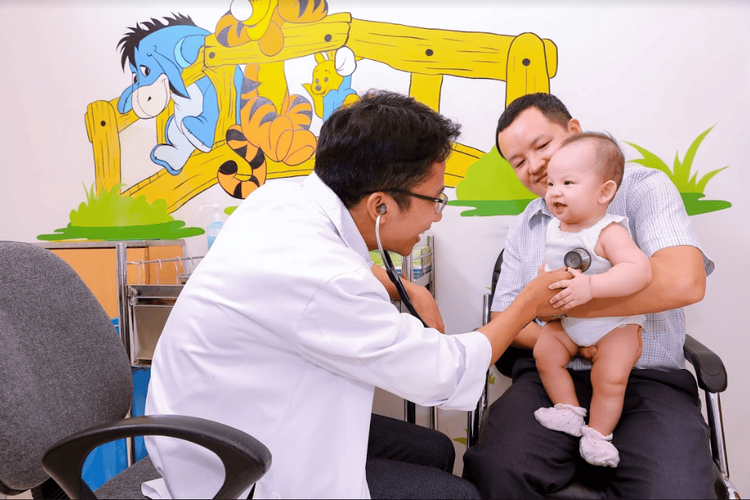This is an automatically translated article.
The article was professionally consulted by Specialist Doctor II Le Thanh Cam - Doctor of Pediatrics - Neonatology - Vinmec Danang International General Hospital.Your 28-week-old baby is now seven months old, at this age they are enjoying their understanding, learning to crawl and maybe even starting to sit up. Some babies may have picked themselves up to go, while others are still happily rolling around to get where they want to go. These are normal changes of child development. Your 28-week-old baby's brain is also working hard, developing rapidly to help him stand up and walk in the coming months. You may notice a change in appetite, a change in sleep habits and times of fussiness and your baby starting to develop new skills. In this article, we will provide you with useful information about the development of a 28-week-old baby after birth.
1. 28 week old baby development
The weight of a 28-week-old baby is much larger than when a newborn was born because muscles have started to develop and take up a large amount of mass. At this stage, children begin to learn how to crawl, so parents need to pay attention to cleaning the house, limiting obstacles and obstacles, ensuring that all dangers are avoided from the crawling area. Many children may also enjoy rolling around on the floor.The methods of movement at this stage are also very different in children, so it is not advisable to focus too much on this issue. Some babies may still be struggling to crawl while others have started crawling around the house on their own. The ability of children's brain development at this stage is also relatively good. The baby's brain is already able to control muscle and strength training, which prepares the child to be able to stand up and walk again.
28 weeks is also the period when most babies are more hungry than ever because they need energy to fuel physical activities as well as brain development. Learning new skills also requires a lot of energy and the child's body will have less time to rest. 28 weeks old is an important period, witnessing the strong development of children both physically and intellectually.

Cân nặng của một em bé 28 tuần tuổi lớn hơn rất nhiều so với khi trẻ mới được sinh ra
1.1. Feed a 28-week-old baby
At this age, in addition to breast milk, parents also need to give their children other foods. However, some babies may find it difficult to accept these extra meals. So it's important to remember that these foods should be added to your child's meals in any way. Mothers can let children participate in family meals, in which children learn to eat the same foods in that meal, of course in a small amount and gradually increase so that children have time to get used to the new foods. that kind of food.A common problem with children at this age is that their tongue is not flexible enough so that they cannot move according to their wishes, so it will be difficult to swallow food. Chewing also becomes a problem for children when they cannot use their tongue to push food aside so that they can chew properly. Some of the symptoms associated with this may include choking, choking, coughing or vomiting during solids. If you find that the above signs are getting worse, you need to take your child to a medical facility to check and evaluate the tongue's activity to see if it is a problem in the 28-week period of the baby or not.
1.2. Put a 28-week-old baby to sleep
For a 28-week-old baby, sleep will often experience a lot of disruption. Babies will often wake up during the night and cry. This happens because babies' rapid muscle growth makes them excited during sleep.Sleeping with both parents can be a good choice for a 28-day-old baby's sleep. However, parents also need to ensure that it is safe to sleep with their newborn baby so as not to cause difficulties for both the baby and the parents. This stage is also the stage where babies can latch on and release the breast on their own even during sleep, so it may not affect mothers' sleep as much as in previous stages.

Trẻ sơ sinh nên ngủ riêng cũi để đảm bảo an toàn
1.3. Tips for taking care of a 28-week-old newborn
Toys for children in the teething period will help children reduce the stimulation when the baby teeth begin to erupt, making them uncomfortable.Let children sleep with their parents but pay attention to ensure the baby's safety in sleep. If the baby shows signs of difficulty in eating complementary foods, whether pureed or mashed, check the flexibility of the child's tongue. It should be noted that children should not be forced to eat anything at this stage if they do not like it because it can create bad effects later.
1.4. Tests and vaccinations for 28-week-old babies
Between the ages of 4 and 7 months, each child will receive a series of vaccines. The third dose of several vaccines will be given at 28 weeks of age including tetanus, diphtheria and pertussis (DtaP) vaccine, polio vaccine, hepatitis B vaccine (HepB), Hib vaccine , the vaccine used in infants (PCV ) and rotavirus . These vaccines will help prevent some diseases such as diphtheria, polio, tetanus, hepatitis B, influenza, and others. If doctors think your baby is at high risk for meningitis, a meningococcal vaccine will be prescribed during this period.
Trong thời gian từ 4 đến 7 tháng tuổi trẻ cần được tiêm phòng vacxin đầy đủ
1.5. Games and activities for 28 weeks old baby
The muscles in your baby's legs and feet at this stage can already develop enough to support walking. Therefore, many children are able to walk at this stage with the support of adults.Children will develop the ability to grasp and throw objects so let them throw whatever toys they have. What parents need to do is limit picking up those toys and let the children move to pick them up on their own, this helps the muscles in the limbs, especially the lower limbs, to be exercised. and develop well, thereby helping children to stand up and walk soon.
Children also begin to learn to listen at this stage. Sometimes babies are also very excited to participate in adult conversations through babbling sounds. Children can also gradually understand what their parents say. To stimulate the child's brain development during this stage, the child's parents can repeat some sounds to get the child's attention and give the child time to speak in their conversations.
2. 28 week old baby milestone
While your baby may have passed some of the 28-week-old milestones, it's completely normal to be slower than others. The changes of the baby in the 28th week are not a rule, but can only be considered as a guide to help parents have more accurate judgments about the child's development stages. Some notable milestones in a baby's development at 28 weeks include:The brain begins to have the ability to collect and process information, the baby can move very quickly anywhere they go prefer. Some children even develop quite quickly to be able to grasp and lift some heavy objects. This stage also sees the development of muscles, especially those in the lower extremities, in preparation for standing up and walking. Once they can safely crawl, they'll be excited to explore the nooks and crannies of the house, so it's important to remove obstacles and dangerous objects from your baby's path. set. 28 weeks can pass in the blink of an eye, but in terms of development, from birth to this point your baby has gone through a multi-faceted developmental period. Babies can sit up, even stand up and eat more solid foods. Vaccination is also necessary during this period. After being vaccinated, your baby will usually have a low-grade fever for a short time. If this condition persists or in case any unusual symptoms are detected, the baby should be taken to medical facilities for timely examination.
28-week-old babies need 5mg of elemental zinc/day to eat well, reach the correct height and weight and exceed the standard. Zinc plays a role in affecting most biological processes taking place in the body, especially the breakdown of nucleic acids, proteins... Organs in the body when zinc deficiency can lead to a There are a number of diseases such as neurological disorders, irritability, etc. Therefore, parents need to learn about the role of zinc and guide them to appropriate zinc supplements for their children.
In addition to zinc, parents also need to supplement their children with other important vitamins and minerals such as lysine, chromium, B vitamins,... errands.
Please regularly visit Vinmec.com website and update useful information to take care of your baby and family.
Reference sources: parenting.firstcry.com, mamanatural.com














